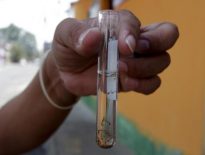Men with prostate cancer had almost a 40% lower risk of dying of the disease if they were taking aspirin for cardiovascular protection, a large cohort study showed.
The hazard ratio for prostate cancer death was 0.61 (95% CI 0.47-0.78) for men who reported taking aspirin more than three times a week versus those who reported less frequent or no aspirin use. Aspirin prophylaxis also was associated with a 24% reduction in the hazard for lethal prostate cancer, defined as metastatic disease or death. Total prostate cancer and the risk of high-grade or locally advanced disease did not decrease with aspirin use.
However, regular aspirin use did not affect the likelihood of developing prostate cancer in the first place, nor was there an association with any of the other risk categories of prostate cancer included in the analysis.
The findings require further study and confirmation but suggest that men already taking aspirin for cardiovascular benefits could have one more reason to consider regular aspirin use, Christopher B. Allard, MD, of Harvard’s T.H. Chan School of Public Health and Brigham and Women’s Hospital in Boston, reported at the Genitourinary Cancers Symposium (GuCS).
Regular aspirin intake may inhibit lethal prostate cancer, probably by preventing cancer progression, Allard said during a press briefing that preceded GuCS, which begins here Thursday. Men with prostate cancer who took aspirin regularly after diagnosis had a significantly reduced risk of death.
The findings do not, however, give men license to begin using aspirin specifically to prevent prostate cancer, he suggested. More work is needed to identify particular subsets of men most likely to benefit from aspirin and to determine the optimal aspirin dose. Men should always consult their physician before considering aspirin use.
Although prostate cancer has a reputation as a slow-growing cancer, the 25,000 men who die of the disease annually offer a reminder that the condition often is progressive, said press briefing moderator Sumanta Pal, MD, of City of Hope in Duarte, Calif. He also emphasized the limitations of the study and its results.
While this work is provocative, it is important to keep in mind that the findings are from an observational study, where surveys and reviews of hospital records were used obtain information, Pal said. These studies are certainly thought provoking but are perhaps best followed by clinical trials where we compare use of aspirin to either no treatment or perhaps to a placebo.
It’s also critical to keep in mind that aspirin can have some potentially severe consequences, such as bleeding, Pal continued. With those caveats in mind, it’s important to have a detailed discussion of the pros and cons of aspirin therapy with your own physician prior to using the drug for prostate cancer-related purposes.
Multiple studies have suggested that regular aspirin use may reduce the risk of several types of cancer, including prostate cancer. Clinical guidelines for several organizations recommend aspirin for cardioprotection, but until last year, no organization had recommended aspirin for cancer prevention. In September 2015 the United States Preventive Services Task Force recommended regular aspirin use to reduce the risk of colorectal cancer.
Previous studies of aspirin and prostate cancer yielded conflicting data, Allard said. Moreover, none of the studies had focused specifically on prevention of lethal prostate cancer. To address the issue, they analyzed data for 22,071 men enrolled in the Physicians’ Health Study. In addition to the relationship between aspirin use and lethal prostate cancer, study objectives included the incidence of total prostate cancer, high-grade disease (Gleason score 8-10), and advanced cancer (T3b-T4 or N1 or M1).
During 27 years of follow-up (533,261 person-years), 3,193 men had new diagnoses of prostate cancer, and 403 of the cancers proved to be lethal. In multivariate analysis, men who used aspirin regularly had a 24% lower risk of progression to lethal prostate cancer (HR 0.76, 95% CI 0.62-0.93).






